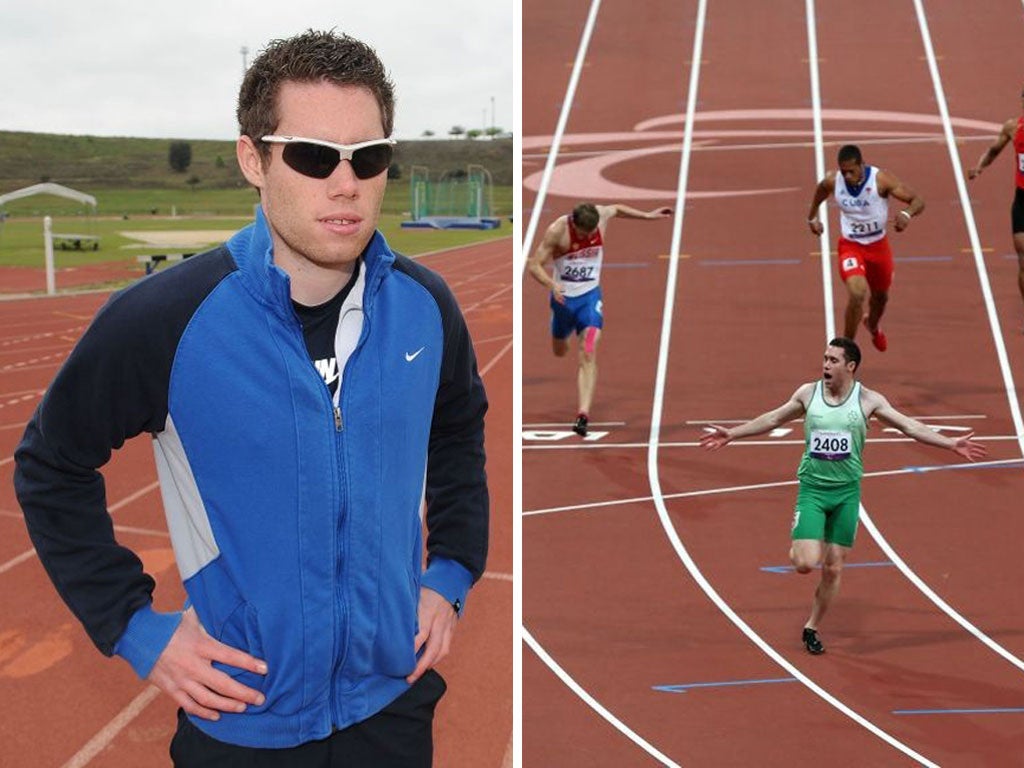Ireland’s sprint star who would have kept GB in second

Your support helps us to tell the story
From reproductive rights to climate change to Big Tech, The Independent is on the ground when the story is developing. Whether it's investigating the financials of Elon Musk's pro-Trump PAC or producing our latest documentary, 'The A Word', which shines a light on the American women fighting for reproductive rights, we know how important it is to parse out the facts from the messaging.
At such a critical moment in US history, we need reporters on the ground. Your donation allows us to keep sending journalists to speak to both sides of the story.
The Independent is trusted by Americans across the entire political spectrum. And unlike many other quality news outlets, we choose not to lock Americans out of our reporting and analysis with paywalls. We believe quality journalism should be available to everyone, paid for by those who can afford it.
Your support makes all the difference.If there's one lesson Britain can learn from Jason Smyth it is always follow up every call. Six years ago the budding Northern Irish sprinter was looking to find some money to help him with his training.
His father got in contact with UK Athletics and the Ireland's equivalent governing body to ask if they could help. Even though Smyth was already running at competition speeds the British never bothered to return his father's calls. Ireland were more than happy to snap him up.
British officials are now ruing the day they ignored Smyth's pleas. In the intervening six years the sprinter - who has only ten percent vision from Stargardt's disease - has become the fastest Paralympian on earth. Much like Usain Bolt did this summer, Smyth won both the 100 and 200 metres in his T13 class in Beijing and went on to successfully defend both titles at London. He broke two world records whilst doing so.
It's a sobering thought but had the 25-year-old been running for Paralympics GB, we might have retained our second place in the medal tables and overtaken Russia.
As an aspiring athlete Smyth says his decision to run for Ireland was more practical than it was patriotic.
"I'm not politically Irish or British, I mean I don't really care you know," he explains, sitting in the athletes village. "There's no saying that if they had come in with something I'd have decided to go with Britain anyway but they made the decision easy. They just didn't do much about it which made my decision to go for Ireland a lot easier."
Much has been made of the sprinters such as Oscar Pistorius and Jonnie Peacock who use prosthetics in place of missing limbs. Yet Smyth's T13 category - which is reserved for runners with limited vision - is the one event were Paralympic athletes run at Olympic speeds.
Smyth himself missed out on qualifying for the Olympics by a heart-breaking 0.04 seconds and won the 100m this summer with a record speed of 10.54s. But he has run quicker before and thinks he can break 10.1. And this is from an athlete who can only make out out very rough, blurred shapes. It is no surprise that come Rio, his target is as much the Olympics as it is the Paralympics.
"First and foremost I have to go back and try and retain the Paralympic titles," he says. "But I don't see why the goal of getting to the Olympics isn't something I shouldn't strive for. I was so close this year and I don't think I've levelled off or peaked."
Smyth spends much of his time training in Florida alongside the world's joint second fastest man Tyson Gay who has described his Irish track-mate as the most technically proficient sprinter he has ever seen
Brought up by his parents as a practising Mormon, Smyth eschews drinking or smoking and he credits his faith with helping him become a better athlete. When he wants to relax and get away from sport he often travels to Salt Lake city where the headquarters of the Jesus Christ Church of Latter Day Saints is headquartered.
"It's a massive part of me and my life," he explains. "It very much makes me who I am. I'd regard myself as being honest and with good morals and those attributes translate into sport. At times it can be a bit of a lifestyle which complements what I do in athletics."
But while Smyth might be the world's fastest Paralympian he knows there is little chance he will ever make the kind of money Bolt makes. Nothing illustrates the Paralympic movement's struggle to find economic parity than the fact that their fastest runner still struggles to find enough cash to do what he does best.
"It is very frustrating," he says. "You kind of keep doing it hoping things will kick off. But there will come a point - and I don't know when it will be - where I'll seriously have to look at normal life. Things are changing this year, I'm going to get married and it's not always going to be about me and running. It's going to be about being able to support and provide."
He adds: "I'm hoping things will change but if they don't you might have to look at things again because life must go on."
Join our commenting forum
Join thought-provoking conversations, follow other Independent readers and see their replies
Comments